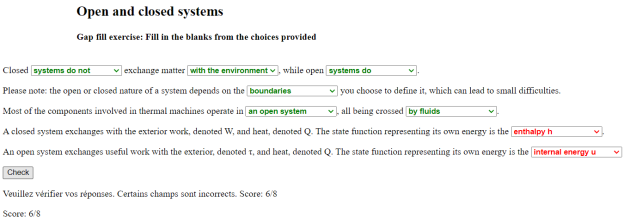Three examples of self-assessment activities developed in HTML 5
For self-assessment, single-choice SCQ and multiple-choice MCQ questionnaires are not very user-friendly. Three other types of more playful activities are:
Drag-and-drop on an image exercises which allow learners to check if they can orient themselves in a sketch or graph. They work by simple drag and drop
Gap fill in texts with or without contextual images which require a little more concentration on the part of the learner, but are very fruitful in ensuring that difficult concepts are well understood
The categorization exercises which complement the previous two activities well: learners organize the elements into categories and thus learn to distinguish their characteristics
Tools for creating self-assessment activities
There are many environments for developing such activities, but most of them are paid and their deployment can cause various problems.
It therefore seemed justified to develop solutions that are easy to implement and free of rights, shared as open educational resources.
At the beginning of November 2023, we shared a set corresponding to the first three types of activity indicated above, using H5P technology, but this solution poses some deployment difficulties.
That's why we've prepared a second much lighter set, also developed in HTML 5.
Drag-and-drop exercise
This exercise asks learners to test their understanding of the architecture of a steam power plant by placing the names of its four main components on the machine sketch.
The result when an error was made with the pump and turbine positions reversed is shown below.
Gap fill exercise
In this exercise, the learner has to reconstruct sentences of the course relating to the differences between closed and open systems.
The result when errors were made, with the correct answers appearing in green and the wrong ones in red, is shown below.
Categorization exercise
This exercise asks learners to check if they are familiar with the difference between state functions and path functions in applied thermodynamics.
The result obtained when an error was made, with the positions of the work W and the pressure P reversed, is shown below.
Documentation and download
Below is a comprehensive overview of these tools.
You can find the set of files for these three examples here, including the Java files of the Gap fill exercise html file builder. These documents are licensed under a Creative Commons CC BY-SA 4.0 (Attribution-ShareAlike 4.0 International) license.



